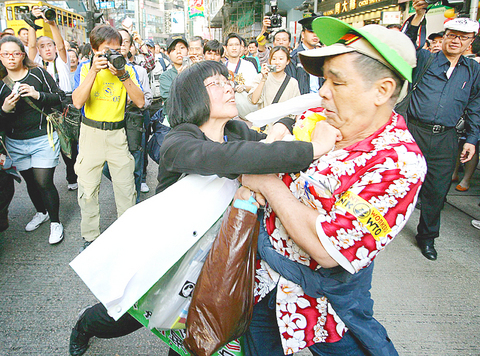Tens of thousands of demonstrators took to the streets of Hong Kong yesterday, demanding the full democracy that was promised when Britain handed its crown-jewel colony back to China eight years ago.
Frustrated with the limited reforms proposed by the city's Beijing-appointed leader, Chief Executive Donald Tsang (
Organizers said on about 250,000 people, with many clad in black, took part in the march -- much higher than analysts' estimate of between 50,000 to 100,000. But police said they counted only 40,000 people when the march began in Hong Kong's Victoria Park.

PHOTO: EPA
The protesters, urged to dress in black for the event, chanted slogans as they left the park, brandishing banners denouncing an unpopular government bill to change the city's electoral system.
At the head of the procession marchers carried a huge black banner emblazoned with the protest's birdcage emblem, a symbol of the political constraints activists feel the city endures.
Tsang's proposals would double the size of the 800-strong committee of Beijing-backed elites that chooses the city's chief executive, and would also enlarge the 60-seat legislature.
But democrats say the proposals do not go far enough, and would amount to a step backward for the full democracy spelled out under the Hong Kong constitution, known as the Basic Law.
The provision gives no timeline for when it might be achieved. Democrats in the parliament, known as the Legislative Council, say they will veto the legislation unless Tsang offers a timetable for democratic reform.
"This is make-or-break time," said the pro-democracy movement's veteran leader Martin Lee (
"The governments [of Hong Kong and China] in the past week have done everything they can to keep the numbers down," Lee said.
A massive turnout could weaken Tsang's political base and rattle Communist Party leaders in China, who fear reform here might weaken the city's economy and spark calls from change on the mainland.
More than half a million people flooded the streets of Hong Kong in July 2003, forcing the withdrawal of an unpopular anti-subversion law proposal and contributing to the resignation of former leader Tung Chee-hwa this past March.
Among the marchers yesterday was political heavyweight Anson Chan (陳方安生), the former deputy leader who even in retirement remains hugely popular.
"I feel there's a need to fight for democracy," Chan said, sharing her political thoughts with reporters for the first time.
"Everyone has a right to protest," she added, denying her decision to go public was a precursor to launching a new career in politics.
Before yesterday's march kicked off, local Catholic leader Bishop Joseph Zen (陳日君) led a prayer service during which he called on Hong Kong to heed the call for democracy.

The CIA has a message for Chinese government officials worried about their place in Chinese President Xi Jinping’s (習近平) government: Come work with us. The agency released two Mandarin-language videos on social media on Thursday inviting disgruntled officials to contact the CIA. The recruitment videos posted on YouTube and X racked up more than 5 million views combined in their first day. The outreach comes as CIA Director John Ratcliffe has vowed to boost the agency’s use of intelligence from human sources and its focus on China, which has recently targeted US officials with its own espionage operations. The videos are “aimed at

STEADFAST FRIEND: The bills encourage increased Taiwan-US engagement and address China’s distortion of UN Resolution 2758 to isolate Taiwan internationally The Presidential Office yesterday thanked the US House of Representatives for unanimously passing two Taiwan-related bills highlighting its solid support for Taiwan’s democracy and global participation, and for deepening bilateral relations. One of the bills, the Taiwan Assurance Implementation Act, requires the US Department of State to periodically review its guidelines for engagement with Taiwan, and report to the US Congress on the guidelines and plans to lift self-imposed limitations on US-Taiwan engagement. The other bill is the Taiwan International Solidarity Act, which clarifies that UN Resolution 2758 does not address the issue of the representation of Taiwan or its people in

US Indo-Pacific Commander Admiral Samuel Paparo on Friday expressed concern over the rate at which China is diversifying its military exercises, the Financial Times (FT) reported on Saturday. “The rates of change on the depth and breadth of their exercises is the one non-linear effect that I’ve seen in the last year that wakes me up at night or keeps me up at night,” Paparo was quoted by FT as saying while attending the annual Sedona Forum at the McCain Institute in Arizona. Paparo also expressed concern over the speed with which China was expanding its military. While the US

SHIFT: Taiwan’s better-than-expected first-quarter GDP and signs of weakness in the US have driven global capital back to emerging markets, the central bank head said The central bank yesterday blamed market speculation for the steep rise in the local currency, and urged exporters and financial institutions to stay calm and stop panic sell-offs to avoid hurting their own profitability. The nation’s top monetary policymaker said that it would step in, if necessary, to maintain order and stability in the foreign exchange market. The remarks came as the NT dollar yesterday closed up NT$0.919 to NT$30.145 against the US dollar in Taipei trading, after rising as high as NT$29.59 in intraday trading. The local currency has surged 5.85 percent against the greenback over the past two sessions, central